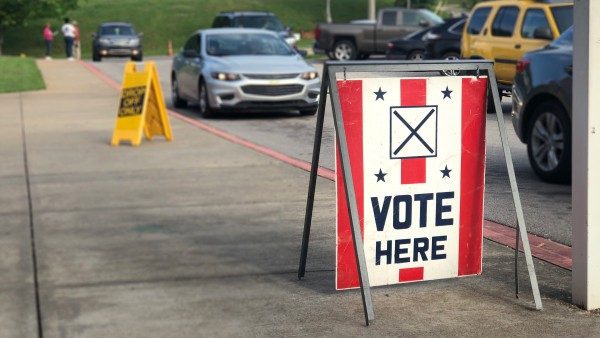By Jackson Sharman and Virginia Martin, BirminghamWatch
Alabama Secretary of State John Merrill expects the state runoff elections on July 14 to go smoothly, despite the complications of having an election during a pandemic.
He’s predicting a voter turnout of 17% to 22%, which is higher than turnout in the 2014 and 2016 party runoffs, when 11% and 12% of voters, respectively, cast ballots. That’s despite a thin ballot.
Only two statewide races are on the Republican runoff ballot and none on the Democratic ballot. But one of those Republican races is the hotly contested battle between Tommy Tuberville and Jeff Sessions to capture the party’s nomination to the U.S. Senate. An appellate court race also is on the ballot, along with local runoffs in some counties.
This year, it’s possible more people than usual will be voting by absentee ballot, which would lighten any crowds at the polls. Because of the threat from the coronavirus, Merrill is encouraging anyone who is worried about their health to vote by absentee ballot.
The deadline to submit an absentee ballot application is Thursday, and the deadline to submit the ballot is July 13, the day before the election.
The absentee ballot application gives voters a list of reasons for voting absentee, and Merrill has said anyone who fears contracting COVID-19 should mark the box that covers physical illness or infirmity.
“We’ve made it easier than ever before” to vote, Merrill said.
So far, the broadened use of the absentee ballot has been approved only for the runoff elections.
However, the state will not be lifting requirements that a copy of a photo ID be sent along with the absentee ballot and that the vote be witnessed by a notary public or two other adults. It also will not be offering curbside voting.
Both of those issues were brought up in a federal lawsuit that argued voting needed to be made easier in Alabama. Initially, federal courts had sided with the plaintiffs, but the U.S. Supreme Court last week disagreed and ruled against the proposed changes.
Merrill had opposed the changes because of worries they would open the door to voter fraud and because state law did not provide for them.
“No one really knows what curbside voting is,” Merrill said. “There’s no law that defines it.”
In a statement to CBS News after the high court ruling, Deuel Ross, senior counsel to the NAACP, which was one of the plaintiffs, said, “Unfortunately, this means that Alabama voters who are at greater risk of severe illness or death from COVID-19 will be required to risk their health and violate CDC recommendations in order to vote on July 14.”
Unless the Supreme Court takes further action, the elections will go ahead as planned.
There has been much debate nationally about mail-in voting, but Alabama has no law on the books that would allow it.
Likewise, Merrill has said all of Alabama’s 1,980 polling places will be open and staffed by volunteers on July 14, hopefully sidestepping long lines that arose when Georgia had its primary last month.
Because this is a primary runoff, Alabama’s cross over voting rules kick in. That means that if you voted March 3 in one of the parties’ primaries, you can vote only in that same parties’ runoff. If you voted a Democratic ballot in March, for instance, you can’t “cross over” and vote in the Republican runoff on July 14. If you didn’t vote in March, you’re free to vote in either of the parties’ primaries.
COVID-19 Precautions At The Polls
Other precautions are being taken at the polls to protect voters and poll workers from the coronavirus. Most poll workers are retired, election officials say, and people over 65 are more susceptible to the virus.
The poll workers will be wearing masks and gloves and equipped with disinfectant wipes and spray as well as hand sanitizer. Federal Cares Act money and a match from Merrill’s office have been used to buy the supplies.
While poll workers will be prepared, Merrill said the state cannot require voters to wear face masks in the polls.
2020 Primary Runoff Voter Guide
BirminghamWatch has put together a packet of information to help you through the runoff election. It includes information about what’s on the ballot, candidate profiles, and a Q&A answering the most frequently asked voter questions. Also coming this week is a rundown of the fierce battle between Tuberville and Sessions to win the Republican nomination to the Senate.

